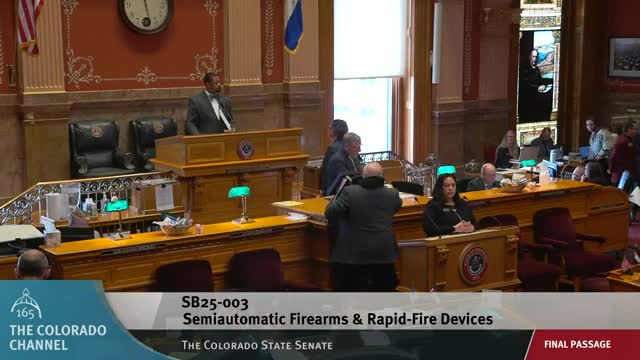Senate approves broad firearms measure after hours of debate
Get AI-powered insights, summaries, and transcripts
Subscribe
Summary
After extensive floor debate, the Colorado Senate passed Senate Bill 3, a measure that regulates specified semi‑automatic firearms, establishes training and permitting requirements for some purchases, and maintains exemptions for common hunting rifles.
DENVER — The Colorado Senate passed Senate Bill 3 on Feb. 18 after extended debate over whether the bill converts aspects of the Second Amendment into a governmental permit regime.
Supporters and opponents spent hours on the Senate floor contesting the bill's reach, exemptions and administrative requirements. Sponsor Senator Gonzales said the measure targets incidents of harm and includes explicit exemptions for the 40 most common hunting rifles to limit impact on hunters.
Opponents framed the bill as an erosion of constitutional rights. Senator Pelton (B.) said the bill would require existing rights to be exercised only after completing training and joining registries, adding that those requirements turned a right into a privilege. Senator Frizzell and others warned the bill could create a state registry and impose recurring administrative burdens on law‑abiding gun owners. Several senators urged additional protections for veterans and victims of domestic violence; amendments addressing those concerns were offered and debated on the floor.
Senators also debated the technical list of weapons included and excluded by the bill, with speakers noting that many modern semi‑automatic hunting variants could be swept up by the statute's definitions. Supporters said the bill's annual review mechanism and targeted exemptions respond to those concerns.
The Senate adopted an amendment (L042 and others discussed during debate) and ultimately passed Senate Bill 3 by recorded roll call: 19 ayes, 15 no, 0 absent, 1 present not voting, and 1 vacant seat. After passage the bill's sponsors added a number of cosponsors on the floor.
The floor debate covered 1) the constitutional dimension of regulating firearms, 2) which models should be exempted, 3) training and permitting requirements, and 4) the bill's expected enforcement costs and effects on legal purchasers. No implementation dates or rulemaking timelines were specified in floor debate; sponsors said stakeholders had been involved in drafting and amendments would continue as the bill moves to the next legislative step.
Votes at the end of Thursday's session recorded the measure as passed and listed multiple senators requesting removal as cosponsors in subsequent moments on the floor.
